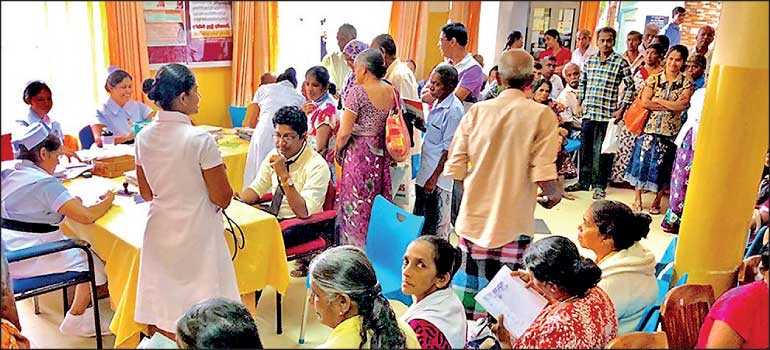Thursday Feb 26, 2026
Thursday Feb 26, 2026
Wednesday, 29 April 2020 02:33 - - {{hitsCtrl.values.hits}}

In the context of Sri Lanka, healthcare cost is mainly financed by combination of government revenue, out of pocket payments of households and minimal amount of private health insurance
Healthcare is something that touches all of us, given the most basic human goal which is that we all want to live healthy lives. The World Health Organization defines that “health is a state of complete physical, mental and social wellbeing, and not merely the absence of disease or infirmity”. 
Many factors combined together in terms of determining the health of a person or community while the circumstances and environment play major role in experiencing the state of health.
To some extent factors like genetic, educational level, family structure, behaviours, norms and beliefs all have considerable impact on health status of an individual or family, whereas socioeconomic environment is considered to be the major influential factor in determining the state of health in humans.
Many scientific researches evidence that higher income and social status are linked to better health. The greater the gap between the richest and poorest people, the greater the differences in health referred as healthcare inequalities.
Universal healthcare
Universal healthcare is concept adopted by the United Nations Sustainable Development Goal number three which ensures that people should have access to quality medical services to improve the health and in an equitable manner without having any kind of financial hardship and barriers. It ensures equal healthcare to every person, no matter who they are or where they live. Unfortunately, many developing countries still struggle to accomplish healthcare equality among its citizens due to various reasons.
Healthcare inequality
Healthcare inequality is when one group of people in an economy are in much worse health than another group. Healthcare inequality is a global issue, the economically marginalised countries are victimised heavily to this worst-case scenario. As many researchers found out, income of a household is positively correlated with the better health outcome.
How a healthcare system is financed
A good health system delivers quality services to all people, when and where they need them. Although, exact configuration of services varies from country to country, but in all cases requires a robust financing mechanism. Even though healthcare financing to its optimal level is inevitable to any country to fulfil equitable healthcare, financing the healthcare has emerged as a prominent challenge in local as well as globally due to various factors.
Most typically, through primary five methods the healthcare is financed around the world such as general taxation of the state, social health insurance, private health insurance, out-of-pocket payments and donations to charities. Especially, many developing countries adopt healthcare financing through general taxation of the state while developed countries have diverted to social and private health insurance with minimal contribution from public funding.
How the healthcare system of Sri Lanka is financed
In Sri Lanka, Government plays a major role in the healthcare system not only in terms of making policy but also in the delivery.
As a mainstream health service provider, the Government deliver healthcare service as free at the point of use to all Sri Lankan citizen, in the meantime private sector also plays a considerable role on business model.
In the context of Sri Lanka, healthcare cost is mainly financed by combination of government revenue, out of pocket payments of households and minimal amount of private health insurance. As a mainstream healthcare provider, the Government accounts 55% of total expenditure, 40% is covered by out of pocket payments of the public and the rest 5% is covered by the health insurance and other source.
In the year 2014, Sri Lanka’s total healthcare expenditure was just 3.5% of GDP which is comparatively very low with developed countries. When we look around the world, the US spends 17.9%, UK spends 17.2% and French spends 11% of GDP to the healthcare needs of the state.
Health challenges Sri Lanka faces
Sri Lanka records impressive healthcare indicators similar to developed countries, however disparities and inequalities remains at large. Disparities between districts in terms of healthcare human resources, technology, infrastructure remains quite high, as result people who lives in the peripheral part of the country have to come to cities to obtain many special and advanced treatment among many difficulties.
Due to on demographic changes, aging population is increasing year by year in Sri Lanka. According to the World Bank, by 2041, one out of every four persons is expected to be an elderly person, making Sri Lankans the oldest population in South Asia. This trend predicts the health security challenges of Sri Lanka as elderly requires special and frequent medical attention on various aspect.
Changes in food and lifestyle leads to surpass the incidence of non-communicable diseases such as cardiovascular disease, diabetes, kidney disease, and cancer as a result healthcare demand is surpassing heavily on healthcare system of Sri Lanka. Further, road traffic accidents and epidemiological outbreak of infectious diseases like dengue, influenza and so on put extreme pressure on healthcare system of Sri Lanka year on year.
As a consequence, the Government of Sri Lanka carries extreme financial burden on its head, since the Government is the main stream healthcare provider. Sri Lanka really struggles to face the increasing number of health challenges in terms of financing and delivery.
It is very evident that modern technologies and medical specialties are limited only the urban areas, also patients who are treated at State hospitals are still required to obtain certain drugs and medical tests at their own expense as an out of pocket payments, Government hospitals remain heavily congested due to increasing number of patients, huge waiting list of surgeries for many years and so on.
Increasing the annual budget on healthcare expenditure is considered as impossible approach to address the growing healthcare challenge due to underperformed economy several decades and extreme resource scarcity on other sectors.
As a result of inability of the Government to meet the increasing healthcare demand, ordinary citizens are being pushed to out of pocket payments to obtain medical service thus result a major financial challenge in the economy at the household level. According to Sri Lanka National Health Account 2013, healthcare is financed by nearly 40% via the out-pocket payment of citizen of the country while nearly 55% is fulfilled by the Government.
This increased tendency of out of pocket payments to obtain is a risky to any developing country, this results uncertainty at the house level and lead to number of social issues. Therefore, this challenge must be addressed promptly with proper alternative approach to have the healthiest Sri Lanka.
The way forward
Winston Churchill used to say: “Healthy citizens are the greatest asset any country can have.” Therefore, the effective healthcare system with appropriate financing modal is the top priority to any country to have healthy citizens.
It is high time for Sri Lanka to think about an alternative healthcare financing model with minimal pressure to Government and the poor segment of community to achieve universal healthcare by addressing the evolving healthcare challenges.
(The writer is the Assistant Manager of Health Insurance at Union Assurance PLC.)